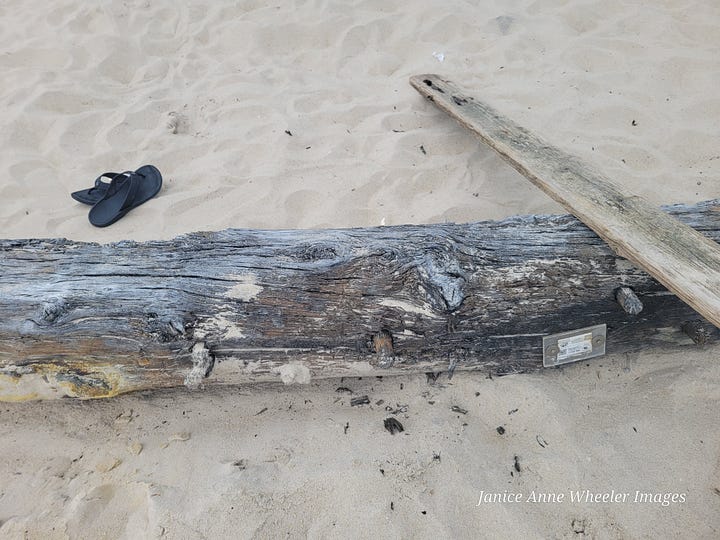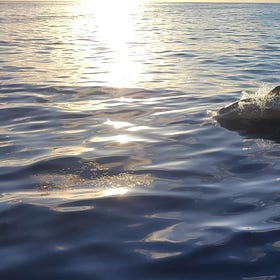I could tell from his stance that he was unaccustomed, awed, as it were, standing there on the very edge of the vast North Atlantic. Half my age, I estimated, tall, midwestern, perhaps, and alone. I didn’t approach and instead watched his revelation, the one I felt decades ago when I experienced such waters for the first time. He stood for long minutes, enraptured, and then reluctantly turned away. I surprised him, standing there. “It’s incredible, isn’t it?” I asked rhetorically. He replied without a second thought, a little breathless. “It is.” Clearly, I don’t know his story; all the descriptives listed above are assumptions, and we’ve heard how dangerous those can be, how they can get you into trouble. But there was no trouble here, except the complication that he’ll now want to return, again and again, to be awed.
There’s something about the oceans. One doesn’t just see them, one truly does feel them, if open to doing so. All your senses come alive.
I spoke to him because I knew he was feeling what I was feeling when I topped the protected dunes and gazed at the expanse. (As a side note, the recognition of strangers is a project that Elizabeth Beggins and I are experimenting with here on the ‘Stack and in the real world; please do read her perspective! It’s completely worthwhile.)
In the past, when I met people who had never experienced the seven seas I used to encourage them to go, see, feel, but now I’m thankful that not everyone has salt water in their veins like I do. A friend’s wife from Colorado hadn’t been to the edge of any continent until, at forty-five, he took her to the Pacific and she just stood there, mesmerized, thrilled, enthralled. She got it. Reverence. Awe. Respect.
Now the two of them traipse joyfully from beach to beach exploring rocky tidal pools teeming with shellfish up north and lengths of finely sculptured sand anywhere. Life was far simpler prior to needing to see the ocean every few months, and much less costly.
This need to experience Mother Nature’s oceans has, ironically, led to developments and resorts in places that would otherwise still be pristine. Fellow ‘Stacker and expat Jeanine Kitchel writes Mexico Soul about indigenous populations and the remarkable changes the rise of the ‘Mayan Riviera’ has wrought on the Yucatán Peninsula. There are many other examples, too, of wild places being displaced, and so I rather selfishly hope that those folks who have not yet gotten mesmerized by my favorite parts of the world never are. It’s too crowded already for this peace-loving sailor. Those changes are a totally different sort of cost; all-inclusive folks jostle for water view seats. After years of strolling beaches, I got my SCUBA certification in Cozumel, Mexico long ago and was thrilled to spend as much time as possible in oceans. SCUBA is definitely not for everyone, you must be comfortable even while vulnerable to all the creatures we have been taught can do us harm. Most folks get their fix without ever venturing in.
The rain was imminent as I walked another mile down the Assateague Island shore to find the keel (bottommost section) of a wooden shipwreck, dark with time but still perfectly recognizable. I had found a smaller, similar piece near Cape May, New Jersey last spring. Lives were lost or ruined not only by ignorance but by treachery; the soulless, greedy folks and pirates in centuries past would move and/or extinguish the now-famous lighthouses that show ships both dangers and safe passageways. Back then, the oceans were the only choice to get where they wanted to be.


There are hundreds of wrecks along this coastline; I’ve written about The Graveyard of the Atlantic more than once. For mariners, there are two shorelines; the one that shows and the one that doesn’t. Some beaches drop into precipitous trenches and miles of water, others are contiguous really, with the land itself, shallow water just covering the sand and creatures that thrive there. Low tides expose those hole-ridden, bizarrely textured places where clams are unseen but breathing and crabs skitter sideways. These lively flats can stretch underwater for miles, hidden from sight and deadly to those who approach too close. No vessels match the powers of Mother Nature. We try to build them ‘unsinkable’ and yet remember the TITANIC; her first time SPARRING WITH MOTHER NATURE was an utter failure with a tremendous price.
DESPITE IT ALL
J’s note: This story was written In December of 2023 after navigating the rough waters off of Cape Hatteras, North Carolina. Cape Hatteras is commonly known as the Graveyard of the Atlantic for a reason and it certainly seems to be our nemesis on here on
*** All those who venture in or on should have healthy, life-preserving respect.
The depth of STEADFAST’s keel is seven feet, that design increases stability and determines where we wander. Hundreds of shorelines are far shallower than that; we travel forty miles from land to round the mid-continental bulge we call Cape Hatteras. Somehow it always seems even farther than that; at a rate of six or seven knots an hour the weather conditions can change far faster than we move. No complaints, though. My almost-solo beach walk lasted only an hour, but that contact reinforced my lifestyle and my senses came alive. Yep, I’m selfish indeed. ~J
Think SPARRING WITH MOTHER NATURE is share-worthy? Please do!
I’m glad you’re here! BIG NEWS on STEADFAST’s repair, rebuild, refit next week so we’ll see you then. THANKS AS ALWAYS.









Devastated. The reef was nearly completely stripped bare above 40 feet deep. I've never seen anything else like it. We lost roof and windows. Mother Nature is in charge!
Having spent week long Summer vacations at the Delaware shore since we were little kids, seeing the ocean was not a momentous revelation. But we were always straining to be the first to say "I see the water!", and of course the wonderful smell of the shore when you get there. But there is a 2 edged sword in that smell! Driving to the Ocean, you long to breathe in the smell of the ocean. But when you are out at sea in rough weather, night time, little or no visibility, and you aren't quite sure exactly where you are, that same 'smell' is the smell of land, and will strike fear in your heart! When the bow watch comes in and says "I smell land!", double check the ded reckoning, soundings, etc.! Of course what with GPS nowadays, you don't even have to leave your bunk to 'navigate' your way to safety. P.S. I'm departing Key West in a day or 2, heading up the East Coast on a Cherubini 48, "Principles", owned by a lovely British couple. We'll be going in to the ICW at Beaufort, N.C. and out at Norfolk, to head up the Bay. Will you be out & about in the Bay, or still on the hard? I hope to cross paths!